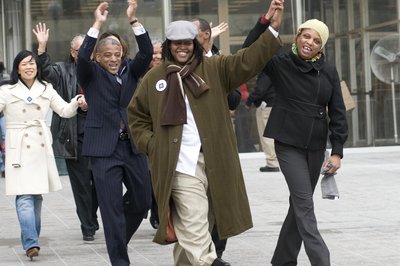Maryland’s top attorney last week handed down an opinion that found the state can recognize same-sex marriages performed legally in other jurisdictions.
Maryland Attorney General Douglas Gansler issued his finding Feb. 24 and, although his opinion does not carry the same weight as a legislative move, LGBT activists in the state welcomed the decision.
“We were thrilled,” said Morgan Meneses-Sheets, executive director of Equality Maryland. “It’s a wonderful step forward in advancing full marriage equality for same-sex couples.”
Gansler wrote that his opinion — addressed to out Maryland Sen. Richard Madelono, who asked him last year to issue a formal finding on the issue — is a “prediction, not a prescription” of how the state’s court would rule if it were to consider a legal challenge on the issue, but that it should be used to guide courts and state agencies in their handling of the issue.
“You have asked whether those marriages may be recognized under state law. The answer to that question is clearly ‘yes,’” Gansler wrote.
“While the matter is not free from all doubt, in our view, the Court is likely to respect the law of other states and recognize a same-sex marriage contracted validly in another jurisdiction,” Gansler continued.
While Maryland law specifically defines marriage as being between one man and one woman, there was no reference on the books to whether the state only recognizes such marriages from other states.
Meneses-Sheets noted that while the opinion does not necessarily mandate that stage agencies honor same-sex marriage from out of state, it does “compel” them to act in accord with the attorney general’s finding, which was endorsed by Maryland Gov. Martin O’Malley.
“I think what makes this even stronger is that the governor came out and said he expects all state agencies to work with the Attorney General’s office to ensure compliance with this, so that support was really important,” she said.
While state agencies will now be tasked with restructuring their benefits and other programs to ensure the inclusion of same-sex married couples, Meneses-Sheets noted the opinion does not extend to the private sector.
“The piece we’re not there yet with is the private companies,” she said. “Since Maryland will now permit the recognition of licenses, though, couples with valid licenses could go into their HR offices and request equal spousal benefits, but the company’s not required to comply.”
When the state approved an employment nondiscrimination law inclusive of sexual orientation — but not gender identity — many private companies took the extra step to extend their policies to transgender individuals, Meneses-Sheets said, predicting that some organizations may again step up and redefine their policies to be in accordance with Gansler’s opinion.
Marriage-equality supporters and opponents testified before a Maryland Senate committee March 3 on a bill that would invalidate Gansler’s opinion and prevent the state from recognizing same-sex marriages performed out of state, a measure that was introduced in February but fast-tracked for a hearing following the opinion, Meneses-Sheets said.
In addition to the out-of-state marriage bill, Maryland’s legislature this week also held a hearing on the Marriage Protection Amendment that would ban same-sex marriage in the state’s constitution, as well as a string of pro-LGBT measures, such as a bill to amend the state’s nondiscrimination law to include gender identity and another to legalize same-sex marriage.
Meneses-Sheets said the recent headlines have garnered the attention of numerous anti-LGBT forces, but she said her agency and other pro-LGBT organizations in the state are working to counter their efforts.
“The National Organization for Marriage folks have set their sights on Maryland, and locally our Catholic Conference, which has been fairly quiet on equality issues, has come out incredibly hard on [out-of-state marriage recognition]. They’re hammering very hard to roll back this gain,” she said. “I think we’d be naive not to recognize the money that is coming into this state to oppose this and the various forces that could have an impact. But we’re putting a good political plan in place to defend our pro-equality lawmakers and put a stake in the ground to protect our families.”
Meneses-Sheets said the issue will more than likely be brought before the Maryland courts — either via a challenge by the opposition or from a married same-sex couple denied rights by a private entity — and noted that the latter needs to be a carefully calculated step.
“Any couple who doesn’t get automatic acknowledgement of their marriage and then heads to court, that’s not the right or most strategic way to do this. We need to make sure we’re talking to all of our friends and partners and are well-coordinated so we can make sure we’ll all on the same page. We need to be working together to make sure this is protected and defended in the most intelligent way.”
Gansler’s decision came one week before same-sex marriages began in nearby Washington, D.C.
Following D.C. City Council’s passage of the law late last year, Congress had 30 legislative days to pass a joint resolution in opposition to D.C.’s marriage law, which would have had to be signed by the president, to nullify the law. Such resolutions were introduced in both houses, but neither was brought up for a vote.
This week, the U.S. Supreme Court ruled against marriage-equality opponents who sought to halt the issuing of the licenses and instead pose the issue to the public via voter referendum, saying it delegates oversight of D.C. law to the district’s courts, which previously ruled against a public vote.
Since Congress missed a day last month because of a snowstorm, the original start date for the marriage-license applications was pushed back from Monday to Wednesday. Couples will have to wait for three business days to actually marry, so nuptials won’t officially begin until March 8.
Jen Colletta can be reached at jen@epgn.com.

